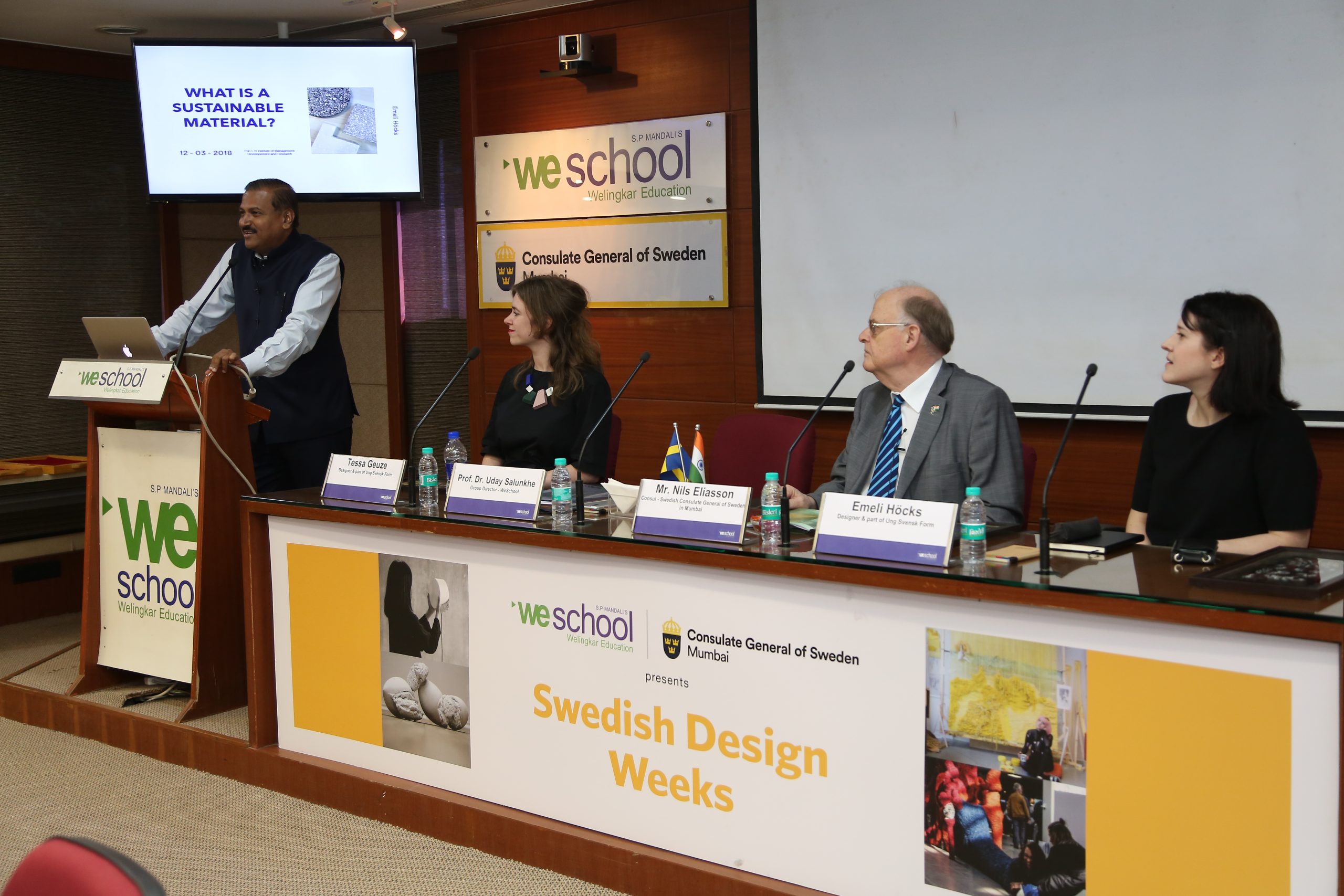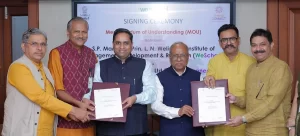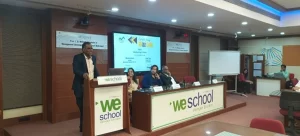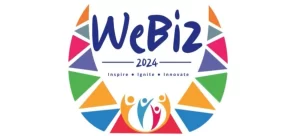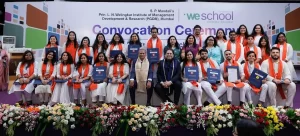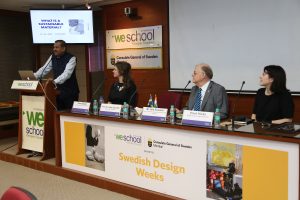
The Consulate General of Sweden in Mumbai in cooperation S. P. Mandali’s Prin. L. N. Welingkar Institute of Management Development & Research (WeSchool) inaugurated the Ung Svensk Form design exhibition in Mumbai today.
The project was created with the aim of increasing the knowledge and widening the scope of new, innovative design; helping it reach new audiences. The exhibition has a power and energy that inspires and that wants to create change. It presents the latest trends in young Swedish design, with its fabulous craftsmanship and new forms of expression. It is organised by Svensk Form (The Swedish Society of Crafts and Design) in cooperation with ArkDes, IKEA, the City of Malmö and Stockholm Furniture & Light Fair. The prime theme of the pieces in the exhibition is sustainability and circular economy.
This particular exhibition has been on an Asia tour and has travelled to Hong Kong and Seoul before India and its next stop in the country is this beautiful city of Mumbai at one of the cities leading management schools S. P. Mandali’s Prin. L. N. Welingkar Institute of Management Development & Research (WeSchool)
From material research, cross-over crafts and the identity crisis of ordinary things – the new design generation shows a growing interest in sustainability and human interaction which is depicted in different art forms in today’s exhibition that displays 19 states of the art design examples. From images to products, recycled goods and unisex fashion dealing with migrant crisis – the exhibition covers a gamut of topics under the overarching theme of sustainability and circular bio-economy.
Apart from this, two selected student groups from WeSchool will showcase their sustainable designs alongside the Swedish designs. The first design displayed is a solar fountain which generates 1MW of energy using two acres of land. Usually one needs four acres of land to generate 1 MW of energy – so this sustainable design has reduced land usage by 50 %. The second design is a Vertical Farming model. This design attempts to produce food in challenging environments, where arable land is rare or unavailable. The method used helps mountainside towns, deserts and cities grow different types of fruits and vegetables by using skyscraper-like designs and agriculture methods. If this design is used, we will save 95% more water, would increase yields, cut transport costs and overcome limited land area.
Diversity is a vital component of contemporary Swedish design, which challenges aesthetics and traditional methods. Sweden’s sustainable design philosophy encourages decisions at each phase of the design process that will reduce negative impacts on the environment and the health of the occupants, without any compromise. It is an integrated, holistic approach that encourages us to act green.
Sweden has taken climate change to the task, drastically helping to reduce the country’s greenhouse gas emissions. Sweden is the first country to enact a Climate Change Law. Future generations are bound to zero CO2 emissions by 2045 and a fossil-free society by 2030. Sweden has since 1970 been in the forefront of devising sustainable system solutions: central heating, district heating, green buildings, air and water treatment and e-vehicles. 50% of our energy supply is renewables and 99 % of waste goes to energy or reuse. Only 1% goes to landfills
The exhibit also included a lecture conducted by international designers Ms Tessa Marije Geuze and Ms Emeli Hoecks on “current trends in Swedish design on sustainability”. In attendance were project stakeholders from Sweden and India, designers, academia and students as well as representatives from a nongovernmental organization.
As a part of the design exhibition, we will also be conducting a panel discussion with heads of academia, designers, Indian & Swedish companies as well as design students on the topic of “Integrating sustainability into the business to transform markets”
Talking about her design, artist Ms Tessa Marije Geuze said “In my work, I explore the emotional connection between man and product. The way we consume today is unhealthy and has to change. For me sustainability is not only about working towards circular models; it is about healing relationships between people and their surroundings. Redefining the way we relate to our environment and creating emotional durable relationships between people and product.”
Speaking about the inspiration behind her art, designer Ms Emeli Hoecks said “For me, a design has always been about exploring materials, methods and learning by doing. The result is always the outcome of an action. By questioning the meaning and the value in things, I find new ways of making. We don´t know what we are facing in the future, and we don´t have any answers, but we know that we have to make things different from now. I want to explore the possibilities of building a sustainable future with a design that is friendly to our planet.”
Giving a Swedish perspective on sustainable design Consul Mr Nils Eliasson said “Design isn’t just about aesthetics; it’s about practical solutions, improving experiences and enriching the quality of life. This exhibit highlights the importance of global challenges like climate change and also throws light on the benefits of circular bio-economy and sustainability. Sweden strongly propagates the concept of democratic design i.e. guaranteeing the product fulfils the highest standards of sustainability, form, function and quality at affordable prices for the majority of people. Taking long-term responsibility all the way from sourcing the material to the people who are producing it, all the way on to the customer will help people make sustainable choices that influence our future in a good way and helps create a circular economy. Sweden’s reputation as an environmental and democratic pioneer within design began with a number of proactive moves in the 1960s. Recognizing a loss of limited natural resources, Sweden was the first country to establish an environmental protection agency, in 1967. E.g. Sweden was the first to move to Viscose as an alternative to cotton for fabrics. In fact, we aim to have a vehicle fleet completely rid of fossil fuels by 2030. We believe that a sustainable and secure environment is best achieved by focusing on long-term design efficiency and a greater supply of renewable resources. I hope you enjoy viewing this exhibition as much as we enjoyed putting it up for you”
Speaking about the event, Group Director, WeSchool, Prof. Dr Uday Salunkhe said, “WeSchool is proud to be associated with Sweden for initiatives that foster friendly ties with India. Our collaboration with Mälardalen University for knowledge exchange programs like Linnaeus-Palme scholarship and hosting the preview of the Swedish design exhibition titled ‘Design for Dignity’ and photo exhibition titled ‘Access Ability’ at WeSchool by Consulate General of Sweden and Swedish Institute have created equal opportunities for Indians and Swedes for inclusive growth. The value of sustainability is deeply embedded in Indian culture. India’s reliance on natural forces in Yoga and Ayurveda has inspired people across the globe to embrace mother earth. Swedish Design exhibition is a conscious effort from Sweden and India to highlight the urgency of sustainability in a digital world. The creative illustration through tangible art is awe inspiring for the young and old. “
The exhibition is available for viewing at Nirvana Room, Fourth Floor, Welingkar Institute of Management from March 12, 2018 – March 25, 2018, Monday to Friday 11 am to 4pm, free of cost. The exhibition will also remain open on Sunday, March 25 from 11 am to 4pm.

